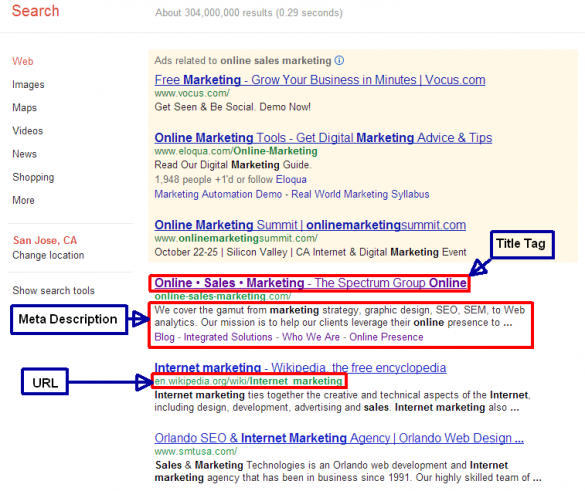Updated March 1, 2025
Reading Time: 3 minutes
If you’ve been working on your business’ SEO for a while, no doubt you’ve heard the acronym SERP a zillion times. Literally, it stands for Search Engine Results Page. But that is not enough, because the real meaning lies in the SERPs contents, and in how they were chosen to be SERPs.
Every search engine (Google, Bing, etc) produces SERPs in response to users who type in keywords or search terms. Generally 10 results to a page, these listings all share the same basic anatomy.
1. Title.
The title tag is a piece of information that search engines look for in order to display your link. Your title tag should adhere to Google’s limit of 70 characters. If it’s any longer it will be cut off.
In a CMS like WordPress, you include this information on every page or post. If you leave this piece of meta data blank, search engines must guess… and they will pull in the page title. On the SERP, the title tag appears as the large blue link. The title tag has an effect on the human searcher; when it contains the keyword/phrase they seek, the higher likelihood they will click on it. It’s conjecture whether the title tag has any influence on search algorithms.
Now… to confuse you further: Page title is what appears at the top of the page. It’s what the human will see when they click on your link. It’s the title of your blog post or webpage.
So in a nutshell:
- Title tag doesn’t literally appear on your page; it’s the hidden bit of data within html code that search engines pull for a SERP.
- Page title is the title that humans see.
- Both are important but for different reasons.
2. Description.
Appearing below the titles in SERPs, the purpose of this element is ideally to provide context for search terms, and help determine relevancy to potential visitors. Think of the description like a mini ad. It’s limited to roughly 160 characters, and it’s a synopsis of what the page or post is about. If you leave the description field blank in your CMS, Google will grab a snippet and plug it in.
The moral of the story here is to control the description, or what is displayed in a SERP. If it’s generic and something that the search engine has defaulted to, you are wasting an SEO opportunity. Conversely, don’t stuff the description with a bunch of keywords. That’s not compelling either. Ultimately, your click through rate will suffer.
3. URL.
Your virtual address on the web, this element is somewhat within your control. It can be constructed to include keywords, thus further asserting your website’s relevancy.
In practice, all three SERP elements are critical selling tools. Working together they should convince both searchers and search engines that your site is exactly what they are looking for. These elements can dramatically affect click-through rates (CTRs), as can positioning on a SERPs.
SERPs…va-va-voom!
Positioning, of course, is determined by search engines and their mysterious ever-changing algorithms.
Which brings me back to CTRs. Even if your listing makes it to the first page but not the coveted first slot, there’s still reason to celebrate. You can still beat out the higher ranking candidates with a superior presentation. In addition to an outstanding description, why not include an image or a 5-star product rating (if that’s relevant)? Authors can also link Google+ accounts to their articles so that bylines and profile photos appear with listings. All of this provides attractive contrast to plain text, and will draw the human searcher’s eye.
The first hurdle is to place on a SERP; your SEO strategies address this piece of the puzzle. Google Anaytics data (by way of Webmaster Tools) can tell you how many impressions (number of times your site has been served up on a SERP). If you get lots of impressions but no clicks, then you need to rework your descriptions to be more human-centric.
Statistics show that the lion share of clicks go to those listed in a SERPs top 10. No need to recreate the wheel. Use our handy template to fill in the blank.
Don’t know meta data from a megasaurus? Or, need to tweak your SEO strategy to get better results?


 Quotes, Duplicate Content and SEO
Quotes, Duplicate Content and SEO
Thanks for the great and descriptive article!
You’re welcome. We aim to please as well as educate.
Hi! Do you know if they make any plugins to help with Search Engine Optimization? I’m trying to get my blog to rank for some targeted keywords but I’m not seeing very good gains. If you know of any please share. Appreciate it!
We actually have several favorite WordPress SEO plugins. Organic SEO can take time, and what fuels it is consistent, relevant and high-quality content. We recommend writing for the human first as overly optimized content is a turn-off to both your readers and search engines.
Thank you for posting this. I really enjoyed reading it, especially because it addressed my question. It helped me a lot and I hope it will help others too.
Hi Mira. We’re glad you found it helpful.
You’ve been really helpful to me. Thank you!
Hi Bernice. We’re glad you found the article helpful.